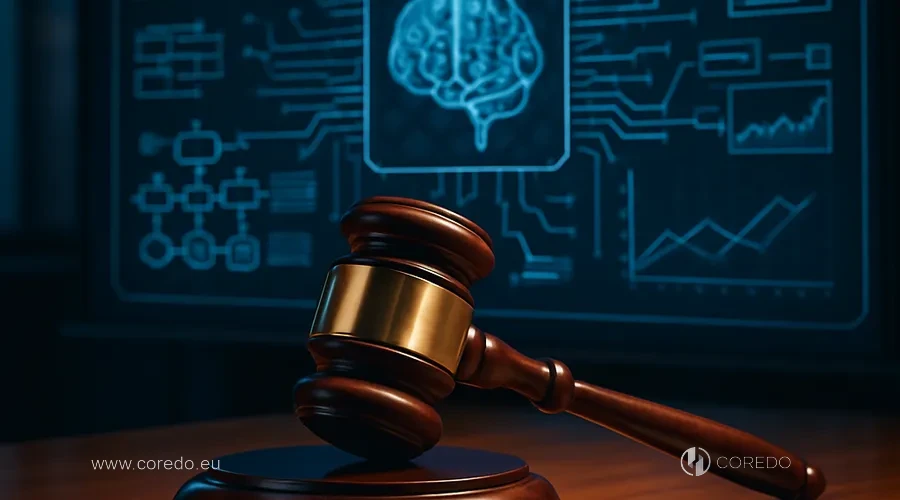Statistics that give pause: according to McKinsey, by 2025 artificial intelligence (AI) will be involved in more than 60% of international trade transactions, and global investments in digital technologies will exceed $500 billion.
Read to the end: you will receive tools that will allow your business to be one step ahead in the digital economy.
Fundamentals of the Commerce Clause and AI regulation

The fundamentals of the Commerce Clause and AI regulation play a key role in defining who and at what level can set rules for new technologies in the US economy. Understanding the historical significance and essence of the Commerce Clause is important for assessing how the state today approaches regulation of artificial intelligence that affects interstate and international trade.
Commerce Clause – what it is and its significance in history
Its historical significance lies in creating a unified legal space for commercial activity, preventing market fragmentation and ensuring federal regulation of commerce. In recent decades the Commerce Clause has become the basis for forming the legal framework of the digital economy, including regulation of financial services, e-commerce, and innovative technologies.
Commerce Clause and digital technologies: impact on AI
With the development of digital platforms, machine learning, and automated solutions, the Commerce Clause acquires new significance. Federal regulation of commercial activity now covers not only physical goods, but also digital services, intelligent agents, algorithms, and big data.
A solution developed at COREDO for a European fintech startup showed: when entering the US market it is necessary to consider not only national laws, but also the requirements of the Commerce Clause, which can limit or expand the possibilities of using AI in cross-border trade.
For example, automating contract and payment processing requires verification of compliance with federal standards, as well as adherence to consumer protection laws and algorithmic transparency.
Judicial precedents and AI regulation
Court decisions on the Commerce Clause shape the practice of applying the law to new technologies. In recent years U.S. courts have considered cases related to the use of AI in e-commerce, issues of jurisdiction, and liability for automated decisions.
As a result, recommendations were developed to minimize legal liability for decisions made by artificial intelligence, including the implementation of mechanisms for algorithmic transparency and control.
The impact of the Commerce Clause on AI in international trade

The importance of the Commerce Clause goes far beyond domestic regulation: this article of the U.S. Constitution defines Congress’s powers to regulate commercial relations with foreign countries and within the country. In the face of the rapid development of AI and its growing role in international trade, there is a need to rethink issues of jurisdiction, liability, and legislative regulation of such transactions.
Jurisdiction and liability in AI transactions
Interstate trade and AI require a clear understanding of jurisdiction and legislative competence. The Commerce Clause regulates transactions between states and countries, but with AI additional complexities arise: automated systems can operate simultaneously in multiple jurisdictions, and data can move between the EU, Asia, and the U.S.
Compliance issues are especially relevant when processing personal data and adhering to AML standards.
Control of cross-border data and digital trade
Legal control mechanisms include requirements for data protection (GDPR, CCPA), licensing of financial services, as well as the regulation of digital contracts with AI elements. The EU has a strict system of control over cross-border data exchange, and in Asia and Dubai there are their own security and transparency standards.
We develop strategies that ensure compliance with laws on digital trade and cross-border transactions, minimizing the risks of Commerce Clause violations and related fines.
Thus, when integrating AI into international transactions, the proper application of Commerce Clause principles becomes particularly important, which is relevant in the context of the development of AI-driven e-commerce.
Commerce Clause and AI e-commerce — challenges of application
Regulatory challenges of artificial intelligence are related to the uncertainty of the legal status of algorithms, automated systems and intelligent agents. The Commerce Clause applies to e-commerce, but does not always take into account the specifics of AI: for example, questions of liability for decisions made by algorithms, or the legal consequences of automation of commercial processes.
This is especially relevant given the diversity of approaches to AI regulation across different continents, which will be examined further.
AI regulation in the EU, Asia and Africa: comparison

AI regulation in the EU, Asia and Africa, the comparison becomes increasingly relevant against the backdrop of rapid development of digital technologies and growing risks associated with artificial intelligence. Different regions of the world are forming unique approaches to creating and implementing AI laws, which determines the operating conditions for companies and users in the respective jurisdictions.
Key EU AI laws and impact on business
The EU has a comprehensive legal framework for artificial intelligence: the AI Act, GDPR, directives on digital services and cybersecurity. These norms set requirements for transparency, ethics, data protection and liability for AI-made decisions. For businesses this means the need to implement compliance procedures, regular algorithm audits and documentation of decision-making processes.
This allowed the client to avoid fines and accelerate entry into the EU market.
Registration of legal entities using AI in the EU and Asia
Company registration for those working with AI requires consideration of specific legal requirements. In the EU it is necessary to provide a detailed description of the technologies used, control mechanisms and data protection. In Asia, the emphasis is on licensing of financial services, AML compliance and transparency of business processes.
AI regulation in Africa: trends and prospects
In Africa there is rapid development of AI legislation, but legal norms often lag behind technological trends. Main risks are associated with the lack of unified standards, difficulties in cross-border data exchange and insufficient protection of intellectual property.
Legal risks and compliance for AI in business

Legal risks and compliance for AI in business come to the forefront as artificial intelligence is implemented to automate processes, handle data and interact with customers. Companies face not only new business opportunities, but also the need to carefully account for complex legal nuances and ensure compliance with rapidly changing regulation. Proper understanding of these aspects becomes the key to safe development and reducing risks for business.
Risks of violating the Commerce Clause for businesses
Violating the Commerce Clause in cross-border AI transactions can lead to blocked operations, fines and lawsuits. Special attention should be paid to the legal consequences of using AI in financial services, where the automation of decisions requires strict control and documentation.
AML compliance and risk management with AI
AML services for business become critically important when implementing AI. Features of AML compliance when using AI include automation of transaction monitoring, analysis of suspicious operations and compliance with international standards (FATF, EU, Singapore).
Data protection when working with AI and compliance with GDPR, CCPA
Data protection legislation (GDPR, CCPA) imposes strict requirements on the processing of personal data, especially when using AI and big data. For businesses this means the need to implement control mechanisms, algorithmic transparency and regular process audits.
Legal support for businesses with AI: strategies and practices

Legal business support with AI: strategies and practices are becoming increasingly important amid rapid technological development. Successful integration of artificial intelligence into business processes requires comprehensive solutions covering issues of liability, regulation, data protection, and ethical standards. The following sections will examine key legal aspects of working with AI, starting with contract law and the specifics of digital contracts.
Contract law and digital contracts with AI
Contract law and artificial intelligence: one of the fastest-growing areas. Digital contracts incorporating AI elements require a clear definition of the parties’ liabilities, dispute resolution mechanisms, and control over automated decisions.
Managing the intellectual property of algorithms
Intellectual property and AI: a key issue for companies developing innovative products. The legal status of algorithms and automated systems depends on the jurisdiction: in the EU and the UK there are strict rules on registering patents and copyrights; in Asia, the emphasis is on protecting trade secrets and licensing technologies.
ROI assessment considering legal risks and compliance
ROI metrics when implementing AI into business processes must take into account legal challenges related to compliance, licensing, and data protection. The profitability assessment of investments includes analyzing costs for legal support, risks of litigation, and potential fines.
Key recommendations for entrepreneurs and executives
Key recommendations for entrepreneurs and executives: this is not just a set of rules, but a practical tool for reducing risks and complying with the legal requirements of business. Below are the main risks and legal requirements that leaders face, as well as recommendations for minimizing them.
Key risks and legal requirements: recommendations table
| Risk/Requirement | Legal mechanism/standard | COREDO recommendation |
|---|---|---|
| Violation of the Commerce Clause | Federal regulation, case law | Audit transactions and implement control mechanisms |
| Non-compliance with AML | FATF, EU, Singapore, automation of monitoring | Integrate automated AML systems |
| Non-compliance with GDPR/CCPA | GDPR, CCPA, transparency mechanisms | Implement regular audits of data processing |
| Legal risks when scaling AI | Licensing, cross-border agreements | Develop a strategy for entering new markets |
| Insufficient intellectual property protection | Patents, copyrights, licenses | Register rights and implement control mechanisms |
| Legal liability for AI decisions | Contract law, case law | Document decision-making processes |
Checklist on the Commerce Clause law and AI
- Audit all cross-border transactions involving AI
- Implement mechanisms to ensure algorithm transparency
- Ensure AML and KYC compliance in each jurisdiction
- Regularly audit personal data processing (GDPR, CCPA)
- Register intellectual property for algorithms and AI systems
- Document decision-making and automation processes
- Develop a scaling strategy that considers international legislation
In conclusion, COREDO’s practice shows: strategic legal support for business using artificial intelligence is not just a formality, but a key success factor in the digital economy. By following these recommendations, you will be able not only to minimize risks but also to turn legal barriers into new opportunities for growth and innovation.